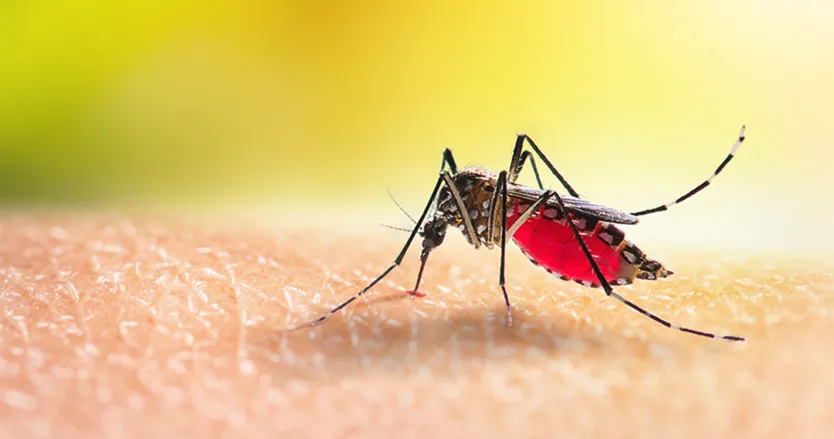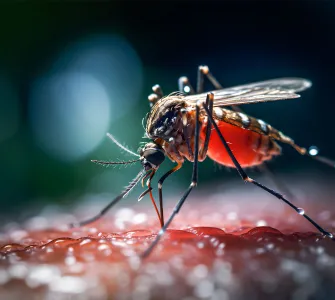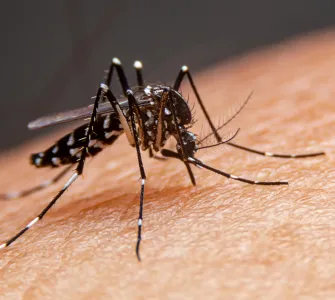Do you know if you’re at risk when it comes to dengue?



About half the world’s population is now vulnerable to dengue infection.1 However, the risk of getting ill from dengue, or of an existing dengue infection becoming more severe, depends on many factors.1-3 Let’s consider some of these below.
Risk factors for dengue
 | 1. Pre-existing conditions
If you already have certain ongoing or pre-existing conditions at the time you become infected with dengue, there is a higher chance of it progressing to a more severe infection.2 These conditions include diabetes, high blood pressure and chronic kidney disease.2 Find out why pre-existing conditions can increase your ‘dengue risk’ here. |
| 2. Age
Old age can increase the risk of severe dengue outcomes.4 On the other hand, young children can be at greater risk of developing severe dengue and complications than healthy adults.5 Learn more about how your age might impact your risk of dengue. |
| 3. Weight
Obesity has been linked to longer hospital stays for patients with dengue.6 Scientists believe that obesity can weaken the immune system’s response to infections such as dengue.6 |
 | 4. Reinfection
There are four different strains of the dengue virus. This means you can be infected more than once (but with a different strain).7 In fact, a second infection with a different strain is more likely to cause severe dengue symptoms than the first infection.7 |
References
World Health Organization. Available at: https://www.who.int/news-room/fact-sheets/detail/dengue-and-severe-dengue. Accessed December 2023.
Sangkaew S, et al. Lancet Infect Dis. 2021;21(7):1014-1026.
Wilder-Smith A. 2012;32 Suppl 1(s1):28-32.
Huang N, et al. Emerg Infect Dis. 2023;29(8):1701-1702.
UNICEF. Available at: Available at: https://www.unicef.org/rosa/stories/dengue-how-keep-children-safe. Accessed November 2023.
Tan VPK, et al. PLoS One. 2018;13(7):e0200698.
Soo KM, et al. PLoS One. 2016;11(5):e0154760.
Centers for Disease Control and Prevention. Available at: https://www.cdc.gov/dengue/transmission/index.html. Accessed December 2023.
NHS. Available at: https://www.nhs.uk/conditions/dengue/. Accessed December 2023.
London School of Hygiene and Tropical Medicine. Available at: https://www.lshtm.ac.uk/research/centres/centre-climate-change-and-planetary-health/infectious-diseases. Accessed December 2023.
Nakase T, et al. Sci Data. 2023;10(1):275.
Man O, et al. PLoS Negl Trop Dis. 2023;17(6):e0011333.
Overgaard HJ, et al. Parasit Vectors. 2017;10(1):356.
Centers for Disease Control and Prevention. Available at: https://wwwnc.cdc.gov/travel/diseases/dengue. Accessed December 2023.
Centers for Disease Control and Prevention. Available at: https://www.cdc.gov/dengue/signs-symptoms. Accessed November 2023.
If travelling abroad, consider extra risk factors at your destination
Dengue is spread to people through the bites of infected Aedes species mosquitoes.1,8 Your dengue risk when you travel will depend on various factors.3
 | 1. Destination
Dengue can be widespread in areas with warm and humid climates such as parts of Africa, Asia, the Caribbean, and Central/South America, as these conditions suit mosquitoes.9,10 However, dengue is becoming more common in parts of Europe and North America too.1,11 |
 | 2. Your surroundings
Though originally considered an urban disease, people can also be infected with dengue in rural areas too.12,13 |
 | 3. The time of day you are out
Dengue carrying mosquitoes mainly bite during the day (but they can also be active at night).14 |
 | 4. How long you stay at your destination
Staying for longer at your destination means a higher chance of being exposed to dengue-carrying mosquitoes.3 |
Adding up the risks
Most of the time, dengue tends to be a mild disease: 1 in 4 or so, of people who are infected experience symptoms.1,15 However, about 1 in 20 of the people who do experience symptoms can have their infection progress to severe dengue which is a life-threatening medical emergency.5,15
For additional information on dengue risk factors, check out the risk tool here.
Remember though, this tool is not a substitute for medical advice – you should consult your doctor if you want a personal risk assessment.
References
World Health Organization. Available at: https://www.who.int/news-room/fact-sheets/detail/dengue-and-severe-dengue. Accessed December 2023.
Sangkaew S, et al. Lancet Infect Dis. 2021;21(7):1014-1026.
Wilder-Smith A. 2012;32 Suppl 1(s1):28-32.
Huang N, et al. Emerg Infect Dis. 2023;29(8):1701-1702.
UNICEF. Available at: Available at: https://www.unicef.org/rosa/stories/dengue-how-keep-children-safe. Accessed November 2023.
Tan VPK, et al. PLoS One. 2018;13(7):e0200698.
Soo KM, et al. PLoS One. 2016;11(5):e0154760.
Centers for Disease Control and Prevention. Available at: https://www.cdc.gov/dengue/transmission/index.html. Accessed December 2023.
NHS. Available at: https://www.nhs.uk/conditions/dengue/. Accessed December 2023.
London School of Hygiene and Tropical Medicine. Available at: https://www.lshtm.ac.uk/research/centres/centre-climate-change-and-planetary-health/infectious-diseases. Accessed December 2023.
Nakase T, et al. Sci Data. 2023;10(1):275.
Man O, et al. PLoS Negl Trop Dis. 2023;17(6):e0011333.
Overgaard HJ, et al. Parasit Vectors. 2017;10(1):356.
Centers for Disease Control and Prevention. Available at: https://wwwnc.cdc.gov/travel/diseases/dengue. Accessed December 2023.
Centers for Disease Control and Prevention. Available at: https://www.cdc.gov/dengue/signs-symptoms. Accessed November 2023.































